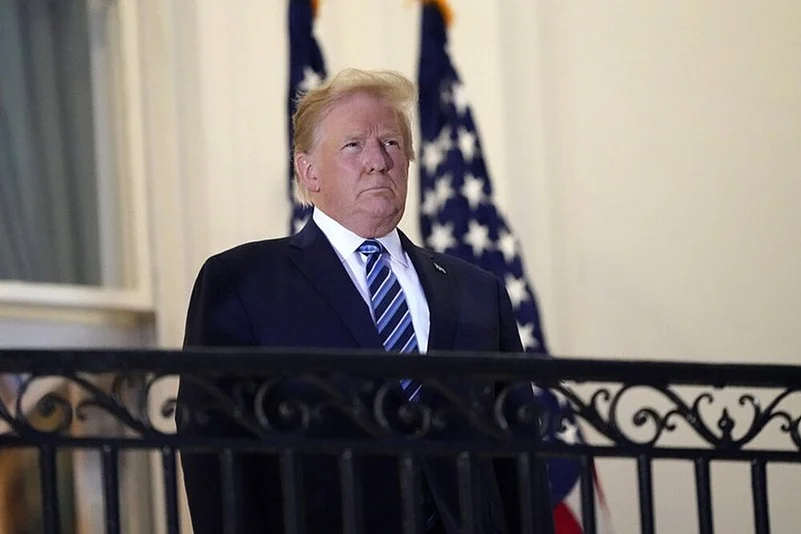When President Donald Trump was running for reelection, foreign-born US residents were rushing to get their American citizenship before it might be too late.
“I didn't know what would happen if Trump got a second term,” said Victoria Abramowska, who became a citizen in Maine this fall, "after all the crazy things he did already.”
Her fears weren't unfounded. The Trump administration was more hostile to immigration and immigrants than any administration in decades, making it harder for people to visit, live or work in the United States and seeking to reduce the number illegally entering the country.
Many of the administration's immigration actions can be quickly undone by Joe Biden when he becomes president on Jan. 20. Yet Trump's legacy on immigration won't be easily erased.
People were denied the opportunity to apply for asylum and returned to dangerous conditions at home. Children were traumatized by being separated from their families. Trump's signature border wall went up in environmentally sensitive areas.
“The damage inflicted in the meantime on people of all stripes — legal immigrants, undocumented immigrants, asylum seekers and more — will not be so quickly reversed and in some cases, can't be reversed,” said Aaron Reichlin-Melnick of the American Immigration Council. “There are people who died because of Trump immigration policies."
Perhaps the most counterintuitive legacy of Trump's immigration crackdown is an apparently unintended one: a surge in foreign residents like Abramowska who rushed to become citizens because they feared the consequences of the crackdown.
Abramowska, a 34-year-old who grew up in Germany but had Polish citizenship, said she worried that Trump could make it harder to become a citizen in the future, complicating her life if she and her U.S.-born husband want to move overseas or just travel. “I didn't know what kind of roadblocks he could put in the way," she said.
Trump set the tone early on immigration, dismissing many Mexican border-crossers as “murderers” and rapists in the June 2015 news conference announcing his candidacy.
Early in his administration, he issued an order that, among other things, banned people from seven predominantly Muslim countries from visiting the country. After a long legal fight, a version of the order was upheld by the Supreme Court in a 5-4 vote.
Trump also quickly imposed a rule denying green cards to immigrants who might need public assistance such as food stamps or Medicaid, which critics said was essentially a wealth test. It also sparked a legal fight and has been placed on hold by a federal court.
He railed about groups of migrants coming to the border and dispatched the military, though there were no signs the Border Patrol needed any help.
The administration sought to halt migrants from crossing the southwest border through measures that included and building about 450 miles of wall and forcing people seeking asylum to do to so in Mexico or Central America.
Once the pandemic started, U.S. Customs and Border Protection began quickly expelling nearly everyone under an emergency authorization. The numbers have started to rise to pre-Trump levels, though some of that is likely from people getting caught repeatedly trying to cross the border illegally.
By one count, Trump made more than 400 immigration policy changes, though he spoke less about the issue at the end of his presidency and focused on “law and order” instead amid the protests over the killing by police of George Floyd.
Biden can undo many of the executive actions. He has said, for example, that he wants to restore the cap on refugees that Trump reduced to the lowest on record and plans to halt construction on the border wall. He can offer to settle the suits challenging administration policies.
“The main priority for the first two years is going to be nothing more than just trying to get the system back to where it was in 2016,” David Bier, an immigration policy analyst with the Cato Institute, said of the Biden administration.
It may take longer to deal with the less tangible fallout.
The Trump administration imposed a freeze in June on new green cards for high-tech workers, seasonal workers and managers of multinational corporations. Such actions damage the U.S. image abroad, Bier said.
“It has made us less promising as a destination and has diverted people from coming to start businesses here or to start employment,” Bier said. “They are going to Canada in record numbers. They are going to Australia in record numbers. They are going to other places, or they are making other plans.”
To some degree, its a matter of certainty, Bier said. The administration's many changes to immigration policy make it hard for anyone to plan for the future.
“If you cant plan and count on the U.S. system existing in some form for years to come, then you don't build your life around something so inconsistent,” he said.
That holds for individuals as well.
“People would say to me that you should hurry up and get naturalized, you never know what could happen,” said Ridhima Bhatia, a 22-year-old recent college graduate from India who became a citizen this month near Washington, D.C.

























